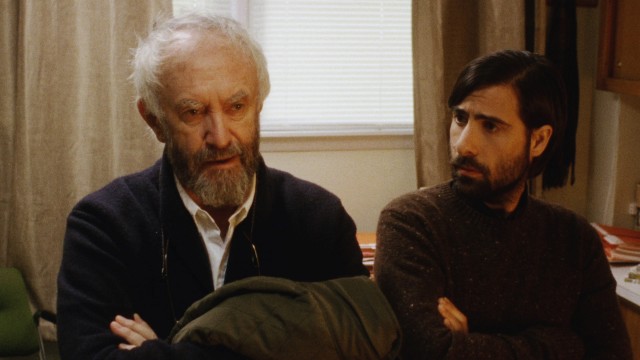Alex Ross Perry likes ironic titles. His previous film, The Color Wheel (discussed last week) was shot entirely in black and white; in his latest film, Listen Up Philip, there is a noticeable absence of listening. Most, if not all, of the conversations are decidedly one-sided: rather fitting for a film that explores the limits of self-absorption. Set in the hyper-competitive NYC literary scene, the film takes characters that feel lived in, because, of course, we’ve seen them before in the films of Woody Allen (the guy had a major role in inventing the middlebrow obsessive walking and talking cinematic subgenre) and develops an intriguing scenario: what if a film, rather than viewing these characters from a romantic viewpoint, like Allen does, instead viewed them from a perspective as cynical and intense as they were?
Listen Up, Philip works, foremost, because of the actors, all of whom perform unaware of how they are depicted on screen. Brilliantly channeling his inner asshole, Jason Schwartzman plays Philip Lewis Friedman, a perpetually resentful writer, whose success only worsens his outlook on life. Trying to move on from his second, just-published novel, he is invited by Ike Zimmerman, an older writer, whom he admires, to take up residence at his home, located a comfortable distance from the turmoil of the city. Played by Jonathan Pryce, Ike is an aged version of enfant-terrible Philip. He encourages Philip’s worst instincts, all the while subtly sabotaging his creative development. In one of the film’s many bleakly comedic moments, Ike instructs Philip to expect disappointment—after all, misery does love company.
Because the film has strikingly little romantic investment in Philip, it can expand its perspective beyond his closed world. When Philip leaves NYC to join up with Ike, he leaves behind his girlfriend Ashley Kane, a successful photographer. Played by Elisabeth Moss (who, in a more just world, would receive an Oscar nomination for this role), she struggles with overcoming her being deeply hurt by Philip’s selfishness as she tries to come to terms with the idea that his leaving her is the best possible thing for her. Throughout the film, she registers this insight in brief flashes that shine through her blue mood. In an innovative touch, the film’s downbeat jazz soundtrack seems to draw focus to her, not to Philip.
What really sets this film apart is its dazzling use of multiple layers of irony that force us to acknowledge that seeing one truth often prevents us from seeing another. Philip and Ike are blissfully unaware of how they have mistaken arrogance for dedication to one’s craft. Little opportunity is spared to show just how absolutely hilarious this remarkable lack of introspection looks. This is showcased in a party scene, where Philip is called on to help seduce two older women Ike has brought home. In the scene, whose discomfort level tops that of anything in The Color Wheel, Philip’s passion is so obviously feigned that his falseness permeates the room like poison gas; after the women leave, Ike takes full advantage to mock Philip for his apparent impotence.
Another theatrical device, used with admirable skill, is a brutally frank voiceover narration, spoken by Eric Bogosian. At first oft-putting (for coldly distancing us), the narration, especially in the later scenes, drives home just how completely unromantic a character Philip is. When Ike arranges for his position as a college lecturer in creative writing, Philip meets a female professor and, during the course of their brief affair, proceeds to wring every last bit of playfulness out of her. As the narration suggests, perhaps Philip has existentially become a character in his own or Ike’s fiction, his mistakes illustrating the literary marketplace value of unhappy endings.
Of course, in a film as smart and uncompromising as Listen Up Philip, his ongoing crisis becomes a send up of how certain white male authors celebrate character flaws as antiheroic virtues. In its heyday in the 70s that also influenced films of “the last golden age” of U.S. cinema, this artistic trend put women on the outside, as a passive audience to masculine ego tripping, passed off, as was the fashion, as soul searching. Listen Up Philip deconstructs this tradition that still, consciously or not, sells books and films.
The closing sequence of first-edition book covers of Philip and Ike’s works, memorably capturing their philosophical pretentiousness on full display, is borrowed from Wes Anderson (thanked in the credits), and pushes Anderson’s quasi-literary imagination in the direction of a powerful honesty: if Philip and Ike hide behind their roles as writers, the book covers suggest they are not very good at doing so. They are exposed, without ever knowing it. You would think that artists, of all people, would be sensitive to this lasting irony, but they, like us, the film observes, tend to have a rather well-honed resistance to it.


